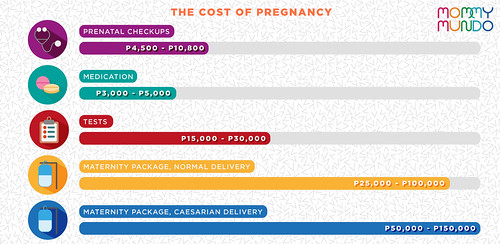Congratulations! You are about to welcome a little miracle into the family soon! The giddiness of joyful expectation never really wears off, even after it strikes you that you would have to get down to the practical stuff to prepare for the new arrival. First things first, what are the financial considerations of giving birth in the Philippines? Here’s a rough rundown of what you need (and how much!) to start saving for.
PRENATAL CARE Having a baby isn’t as simple as baking a cake and popping it out the oven. Proper care in the duration of your pregnancy and after is important.
1. Checkups and Consultations Costs these days range from P500 to P1,200 a pop, depending on where your OB-Gyne is holding a clinic. The frequency of your checkups will depend on how well your pregnancy is going and how far along you are. Some doctors give the first consultation as a freebie, but some checkups that involve procedures may have added costs. It’s perfectly okay to ask if they are affiliated with any HMO you might have, the hospitals they are a resident of, and how much they charge for the delivery. Don’t be afraid to switch or transfer to another practitioner if you are not completely comfortable with anything. It is your right to seek another opinion and choose who will assist you.
2. Medication Normally, your doctor will prescribe the usual round of prenatal supplements like multivitamins, malunggay capsules, calcium, folic acid, and iron that will cost around P3,000 to P5,000 for the entire term. Of course, this depends on where you buy them. Remember that branded meds are always priced higher than the generic ones and any other medication you may need for special medical conditions will also add to the cost. If you are already taking medication for an existing condition, make sure to tell your doctor about it so it can be adjusted for your pregnancy.
3. Tests Your doctor will ask you to take lab tests and ultrasounds to screen for anything that can affect you and your pregnancy. Spread throughout the duration of your infanticipation, you may need to set aside a budget ranging from a conservative P15,000 to an extensive P30,000. If you are having a complicated pregnancy, added procedures will cost as well.
4. Preggy supplies From clothes to anti-nausea candies, special underwear and books for new parents, the costs are at your discretion and ability to resist temptation!
DELIVERY Choosing where to welcome your new addition also needs to be considered. Will you give birth at home, in a lying-in clinic, or a hospital? It can get tricky as your preferred doctor may not be practicing at the hospital you have your eye on. Try to find a balance between convenience, cost, and comfort.
Hospitals with maternity packages can cost you from a normal birth package of P25,000, going up to P50,000 for Caesarian section births. Barring medical emergencies, you can pretty much expect to pay how much the package you picked costs. Make sure to check out what inclusions and professional fees of the doctors are covered by the package. Don’t be afraid to ask your doctor for advice regarding your budget. Remember that the package prices can still change, are for uncomplicated pregnancies and deliveries only, and only covers a one- to two-day stay for normal delivery and three to four days stay for C-Section births.
A C-section will always cost more than normal delivery, but it’s also the choice of what room you want (and how long you stay) that will raise or lower the cost. A Lamaze birthing room, for example and a posh suite will automatically jack up your bill to six figures! Choosing a ward, on the other hand, will lower all the prices, including your doctors’ professional fees.
You need to set aside more if you have a delicate pregnancy. Emergencies may happen, so it’s best to be prepared. Save like you’re going for the C-section, roughly starting around P50,000 going up, so you have a buffer!
FINANCIAL ASSISTANCE Aside from saving up, you can look to employee benefits for assistance. As a Social Security System (SSS) member, you are entitled to a Maternity Benefit that depends on how much you’ve regularly contributed for about a year and a half. The maternity benefit is equivalent to 100 per cent of your average daily salary credit multiplied by 60 days for normal delivery or miscarriage and 78 days for Caesarean section delivery. Go to www.sss.gov.ph for assistance in computing your SSS benefit.
With Philhealth, the coverage of your hospital bill depends on where you are giving birth. You and your hubby’s employers may also have a maternity package that you can tap for cash, aside from the usual Maternity and Paternity Leave.
In summary, here are the numbers you should start working on: 
Of course, the costs don’t stop there. Be sure to set aside a budget for your family after bringing home baby from the hospital. Figure out a way to factor in diapers and baby things into your grocery budget. You also have to keep regular pediatrician appointments with vaccines and supplements. And we’re not even talking about the time when baby starts going to school! Welcome to the world of parenthood!

Leave a Reply